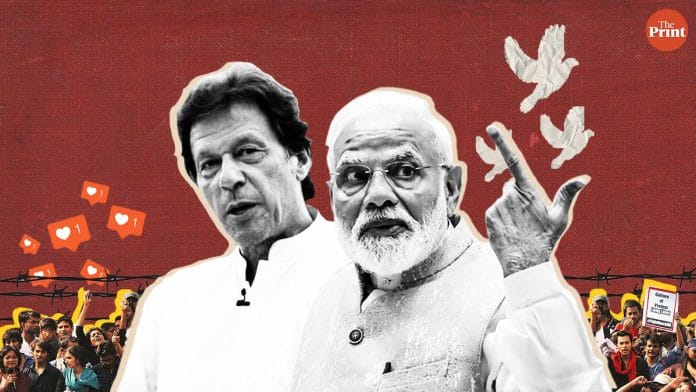As Pakistan launched a series of retaliatory actions against the Narendra Modi government’s move to repeal Article 370 and turn Jammu and Kashmir into a Union Territory, it failed to grasp the reality: none of its actions is really going to affect India. Pakistan Prime Minister Imran Khan should have known that India’s move in Kashmir, while being a surprise on both domestic and international audiences, was planned and calculated. Long before Union Home Minister Amit Shah made the announcement Monday, the Modi government would have already taken into account Pakistan’s possible comebacks.
And it couldn’t care less.
A rattled Pakistan kicked off its side of proceedings by summoning Indian High Commissioner Ajay Bisaria; its latest position has been to cut “all diplomatic ties” with India. In between, Imran Khan and his government adopted several measures to provoke a reaction out of the Modi government but none bore the intended result. It’s easy to see why.
Also read: With Kashmir move, Modi has ensured map-making comes to an end in subcontinent
What diplomatic ‘ties’
Let’s begin with Pakistan’s stock response — of dealing with any uncomfortable scenario at the level of envoys. Pakistan foreign minister Shah Mehmood Qureshi said Wednesday the Imran Khan government, after holding a high-powered meeting of National Security Committee, has expelled the Indian envoy and recalled its ambassador in New Delhi. This is not the first time that Pakistan has trained its guns on the envoys.
As far as rethinking treaties and agreements are concerned, Imran Khan should know that these are not government-specific and co-terminus with the two countries’ governments. Yet, if Islamabad is willing, India should be ready, and rather happy, to withdraw from the Indus Water Treaty, which many believe is an agreement that gives away a major share of the water from three eastern rivers to Pakistan, much to India’s disadvantage.
Among other measures, Pakistan has once again decided to ban the use of flight path for Indian aircraft, which was previously closed after India’s strike in Balakot and then reopened last month. The ban on air space may hurt India for a while until it gets used to it and is prepared for a long-drawn war of nerves on this issue.
Also read: Kashmir Banega Pakistan: A dream sold to brainwash us since childhood now lies in tatters
India’s trade with Pakistan
It would be foolish on the part of Islamabad to think that it would be able to hurt India by blocking trade deals.
In 2009-10, India’s exports to Pakistan was worth Rs 74.6 billion as against Rs 13 billion worth of imports. Contrary to popular perception, India’s exports to Pakistan increased from Rs 138.3 billion in 2013-14 to Rs 144.3 billion in 2018-19 (as against Rs 34.8 billion worth of imports).
Former Indian high commissioner to Pakistan T.C.A. Raghavan has said that the two countries have never had trade of a large volume. He described Pakistan’s efforts now as those “taken… to show their political constituencies that they are dealing with the matter”.
Also read: Art 370 killed because Hindu Jammu, Buddhist Ladakh & Muslim Kashmir only benefitted Pakistan
The UN angle
A lot has been said about the position of the United Nations on the Kashmir issue. But Pakistan has not kept its side of the bargain while calling upon India to do its bid. It repeatedly asserts taking the matter to the UN — and now also to the United States after President Donald Trump’s show of interest — but Pakistan keeps forgetting that any UN resolution on Kashmir has to first pass the test of ending state-sponsored terrorism originating from its own soil.
Pakistan can take the Indian abrogation of Article 370 to the UN Security Council, announce to observe 14 August (its Independence Day) as “Solidarity Day with Brave Kashmiris”, or continue to mark 5 February as ‘Kashmir Day’ on its calendar — it won’t make Amit Shah and Narendra Modi sit up and take note of its actions. I don’t see how it could.
The author is former editor of ‘Organiser’. Views are personal.







The real battle of nerves and attrition has started only now.
Eventually things will hopefully become normal but it may very well take years- I’d say 20 years or a generation
All over the world, strains are appearing between upstream and downstream states for the sharing of river waters. The Nile, in Africa. As far as the IWT is concerned, India has not been able to utilise the small portion assigned to it all these years. To the east, mitigating the floods that harm Assam and Bihar each year would require India, Bangladesh, Nepal and China to cooperate, even invest, together. Perhaps India and Pakistan might see at a future date the advantages of working together, partly through SAARC.
I have been seeing your posting as regularly. What I can understand is is obsession with two countries: Pakistan and China, two worst neighbours any country can have. You always expect India to keep sitting opposite and taking to them face to face. After the talk, both these guys are known whacking on the back and go.
Not having a continuing security threat from two nuclear armed and also conventionally powerful states, acting in concert, would have released a lot of resources for development. Easily added 1, possibly 1.5%, to our rate of growth.